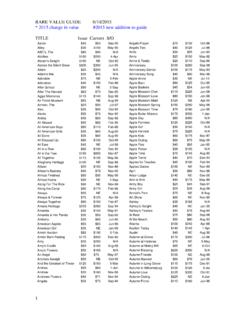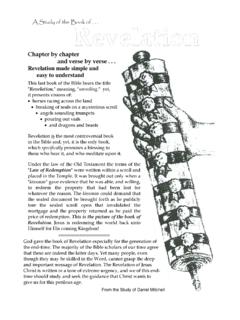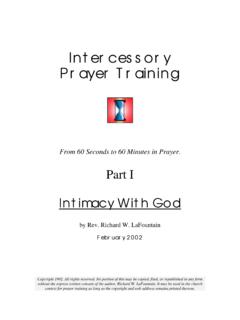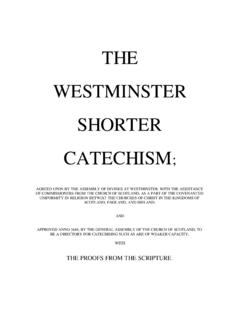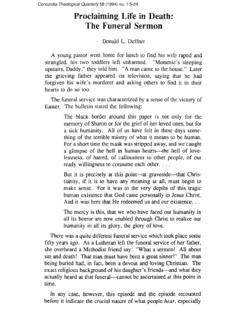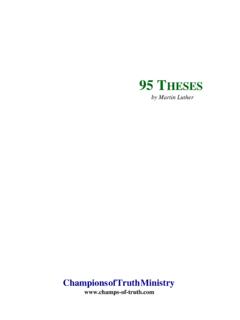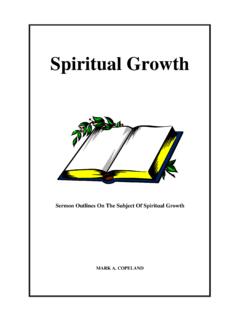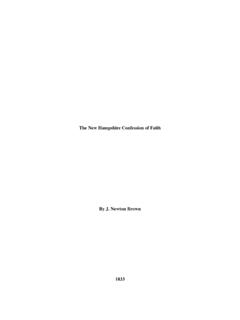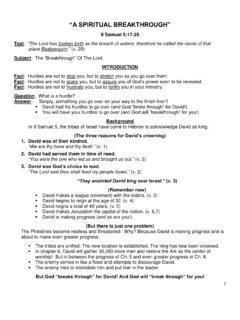Transcription of A CONCISE COMMENTARY ON THE BOOK OF ISAIAH
1 A CONCISE COMMENTARY ON THE book OF ISAIAH Eugene Kimble, Made available by Biblical Studies Ministries International, Inc. 2 A CONCISE COMMENTARY ON THE book OF ISAIAH Eugene Kimble, Introduction: ISAIAH s name means, The LORD is salvation, and in chapter 12, verse 10 ISAIAH says of himself, Behold, God is my salvation. Edward J. Young, in his fine three-volume COMMENTARY of ISAIAH , explains what the prophet meant: God is the author, the cause, the agent, the accomplisher of that salvation.
2 Salvation apart from God is unthinkable.. In salvation we are delivered from the guilt and the pollution of our sins, and we receive the wondrous and blessed righteousness of the eternal Christ. God is our Father, and by an act of His omnipotent grace adopts us as His own children. In the fullest sense, we receive God. What more can we have what more do we need than God Himself? He is our salvation. If God were not my salvation, the people of God might reason, there would be everything to fear. Man is lonely, man is despondent; he lives in the blackness of long night.
3 There is everything to fear until God become his salvation. Then there is nothing to fear. Only one may speak with such boldness and confidence; he is the one to whom God has become salvation. With full security and assurance he may proclaim, I will trust and not be afraid. This is a God-given certainty of hope which may be possessed only by the redeemed. Every man must have might and strength in order to live. Unless there is something upon which one can base his life, he will go to pieces. Some lean on drink; some on narcotics, some on dogged willpower; and some on bravado; some on religion ; all with a single exception lean on man.
4 That exception consists of those who find their might and their strength in Young gives the underlying theme of ISAIAH : God will come in judgment upon those who refuse to repent. He will redeem the obedient believer. Seldom does a pastor or Sunday School teacher give a full exposition of the book of ISAIAH . This CONCISE COMMENTARY is offered with the prayer that it may present an overview of ISAIAH as a whole that will permit preachers, teachers, and students to grasp the blessed truths proclaimed by God s prophet. I. Prophecies concerning God s people Israel and His city Jerusalem, 1:1-6:13 A.
5 God s people move toward hardness of heart having ears that would not hear God s Word and eyes that could not see God s working power, 1:1-6:13 1. The purpose of chapter one is to show the relationship between the sins of the people and their sufferings, and the need for further purification a general introduction setting forth a sequence of incidents that God s people will experience in more than one emergency, 1:1-31 a. The sin of the people is shown to be (1) The cause of their separation from God, and (2) The cause of the calamities coming upon them, 1:2-9 b.
6 The relationship of their corruption with religious rites is set forth to demonstrate that worship, practiced with a heart far from God, is in itself of no value, 1:10-20 1 Edward J. Young, The book of ISAIAH (Grand Rapids, Mich.: Eerdmans, 1965), I, 403-404. 3 c. The people s present moral corruption is contrasted with Jerusalem s former glory and also with her future when the wicked will be destroyed, 1:21-31 2. Three distinct pictures of God s people, 2:1-4:6 a. The future exaltation of God s people as the source of instruction concerning true spirituality, 2:1-5 b.
7 The present idolatry and wickedness of God s own people, 2:6-4:1 (1) The coming day of the Lord, 2:6-22 (a) Since His people are morally and religiously indistinguishable from the rest of mankind, 2:6-9 (b) Then God s sure punishment will humble them and thereby exalt Himself, 2:10-18 (c) What the worldly religious will do when God shows their false gods to be without any power whatsoever, 2:19-22 (2) The coming judgment on Jerusalem and Judah, 3:1-4:1 (a) Their nourishing support of food and water will be completely taken away, 3:1 (b) The leaders will also be removed (3:2-3) and Judah will fall into a state of anarchy and chaos, 3:4-7 (c) Judah s destruction is the result of sin, particularly God s people following wicked rulers instead of Him, 3:8-12 (d) Since the people would not listen to the Word of repentance spoken by His prophet, God takes His place in court as their Judge 3:13-15 (e) When the women become as immoral and irreligious as their men and leaders, the situation is incurable.
8 Thus God because of their wickedness will bring upon them the loss of their present delights as well as widowhood, captivity and disgrace, 3:16-4:1 c. Messiah, the Branch, and His cleansed, holy and future people, 4:2-6 (1) The beautiful glorious Branch, planted by the Lord, 4:2 (See Jeremiah 23:5; 33:15; Zechariah 3:8; 6:12) (2) Those who survive God s judgment will be holy and free from all filth and stain, 4:3-4 (3) God will protect and manifest Himself to His people as in the days of the Exodus from Egypt, 4:5-6 3.
9 The prevalent iniquities of God s people and the judgments that, in consequence of these, are to fall upon them, 5:1-30 a. God s message spoken in a parable, representing Israel as His vineyard, which contrary to all expectation has produced bad fruit and therefore is given up to devastation, 5:1-7 b. A catalogue of their sins with appropriate punishment, 5:8-24 c. God s means of inflicting destruction and the end result, 5:25-30 4. ISAIAH s vision of the Lord, 6:1-13 a. What ISAIAH saw, 6:1-7 b. What ISAIAH heard, 6:8-13 (1) Go and preach repentance to a non-responsive people, 6:8-10 (2) The people will be hardhearted and unrepentant until the land is destroyed, the people deported and only a handful remains, 6:11-13 4 II.
10 The comfort of Immanuel s deliverance and salvation from, and during, Assyria s (the World s) oppression, 7:1-12:6 A. The Divine Sign of Immanuel the Virgin s wondrous Son, 7:1-25 1. The Promise of deliverance of God s people (Judah) from her worldly enemies (Syria and Northern Israel), 7:1-16 a. Enemies fighting against God s people, 7:1-6 b. God fighting for His people, 7:7-9a c. Immanuel the Divine sign of the Virgin s Wondrous born Son delivering God s people, 7:9b-16 (See Matthew. 1:18-23) (1) Ahaz the no-faith-king, 7:9b-12 (2) God have faith in His miraculous sign, 7:13-16 (a) A virgin will give birth to a Son, 7:13-14a (b) The Child will be God With Us, 7:14b (c) The Divine Child gives immediate deliverance, 7:15-16 2.


